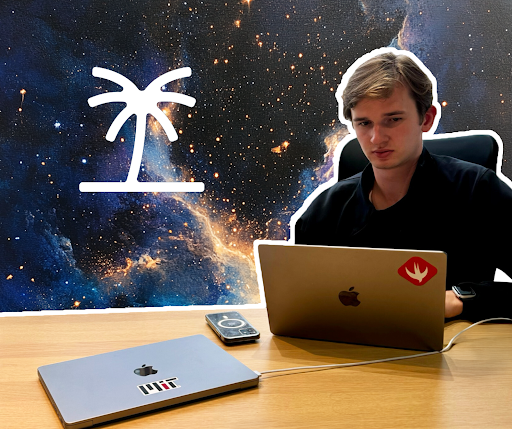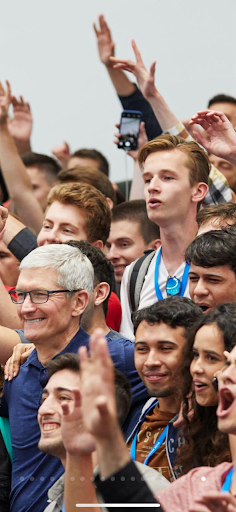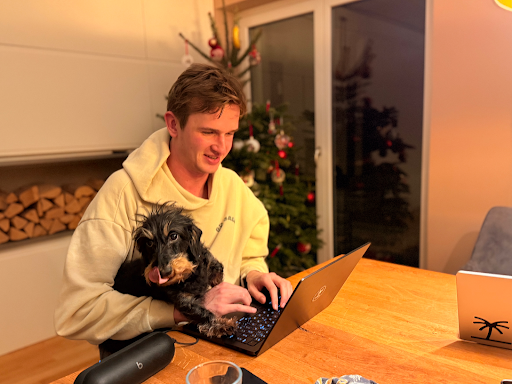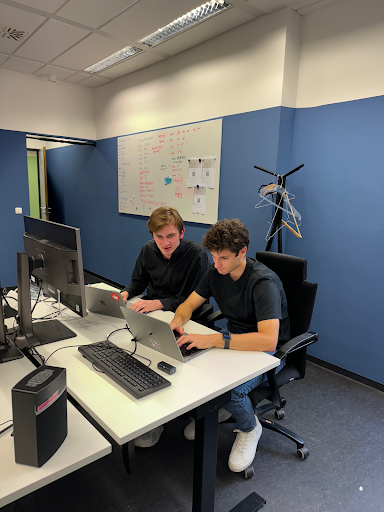Felix Schlegel Is Redefining Human Computer Interaction With AI

It was well past midnight when 12-year-old Felix M. Schlegel found himself hunched over his laptop, eyes fixed on the lines of code scrolling up his screen. He was fine-tuning a web application that brought the old-fashioned piggy bank into the digital age—an online platform where friends and family could pool funds through PayPal instead of fumbling with spare coins. "He's always been driven to make everyday tasks more efficient through technology," says his longtime friend and programming partner, Marvin von Hagen. The two first crossed paths in middle school, forging a bond over code sprints and hackathon victories rather than playground games.
Schlegel's curiosity did not remain confined to his bedroom. By the age of 14, he was entering university-level programming contests across Germany. One standout moment came at Jugend Hackt, Berlin's premier hackathon for young coders, where Schlegel introduced a prototype for "smart shoes." With vibrating sensors embedded in the soles, the device delivered turn-by-turn navigation without the need to stare at a phone. "I wanted to free people from having to stare at their phones so they could focus on the world around them," he explains.
By age 16, his talents had caught the attention of Apple engineers. After winning the highly selective Worldwide Developers Conference (WWDC) challenge in both 2018 and 2019, Apple flew him out to Cupertino California where Schlegel presented a 2D volleyball game built in Swift. In his second appearance, he showcased an augmented reality model of San Francisco International Airport, complete with detailed 3D reconstructions, real-time flight data, and animated planes. David Nadoba, an Apple engineer who mentored him during WWDC, was struck by Schlegel's inquisitiveness. "He asked in-depth questions about ARKit that even some seasoned developers don't think to ask. It was clear he was already envisioning more complex use cases."

During his second WWDC, Schlegel also had a brief but memorable conversation with Apple CEO Tim Cook. "Tim emphasized the importance of maintaining curiosity. That simple advice always stuck with me," Schlegel recalls.
Schlegel's rapport with Apple didn't end at WWDC. He was soon brought on as an engineer, where he played a key role in integrating Apache Kafka—a leading platform for collecting and processing streaming data—into the Swift ecosystem. The experience, he says, sharpened his understanding of large-scale systems and the evolving field of real-time data processing.
Fresh off his Apple stint, Schlegel took on another challenge: a global engineering competition hosted by Elon Musk's Boring Company. The contest challenged teams to develop next-generation tunnel-boring solutions for future transportation networks. Schlegel co-founded "TUM Boring" from his dorm room in Munich, assembling a group of 65 mostly graduate-level engineers in just ten weeks. He also secured $1 million in funding from over 80 donors and sponsors to build a 40-foot, 22-ton tunnel-boring machine.
Out of 390 international teams, TUM Boring emerged victorious, reflecting Schlegel's knack for combining technical precision with managerial finesse. "He brought together experts twice his age and made them believe in a vision," says von Hagen, who also contributed to the team. "Even those who doubted him at first were impressed by how effectively he led the project."
Schlegel's academic journey later brought him to two of the world's most respected institutions for technological research: the University of Cambridge and Stanford University. At Cambridge, he studied Simultaneous Localization and Mapping (SLAM). SLAM is a process that enables machines to map and understand physical spaces while tracking their own position. This research is critical for emerging technologies, including autonomous vehicles and advanced robotics. "His SLAM work was meticulous," commented Thomas Bohné, the founder and head of the Cyber-Human Lab at the University of Cambridge's Department of Engineering. "He helped optimize our system so it could handle complex, dynamically changing environments."
At Stanford, Schlegel contributed to projects aimed at optimizing treatment strategies for hypertension. As part of Stanford's Biodesign program, he worked on AI-powered medication titration. There, he built two complementary applications. One for clinicians to monitor patient data and another for patients to track their vitals. "We saw a considerable reduction in guesswork for adjusting prescriptions," recalled Oliver Aalami, a Stanford professor who oversaw parts of the project. "Felix's algorithms did a lot of the heavy lifting by analyzing patient history and making data-driven recommendations."

Armed with a strong background in Artificial Intelligence and Augmented Reality, Schlegel co-founded Interaction. The mission was to streamline highly complex business processes through machine learning tools. He partnered with Marvin von Hagen, a longtime friend and collaborator whom he had met at a hackathon when they were both in middle school. Prior to Interaction, Schlegel and von Hagen had developed an AI-driven content generator that produced news articles at scale. The tool generated six figures in revenue from publishing clients.
That early success attracted top investors from Silicon Valley and shaped the broader vision for Interaction. "We realized that if AI can revolutionize one industry, it can likely transform many others," said Schlegel. Investors seem to agree. Interaction attracted venture funding before completing its product launch. It's an uncommon achievement that underscores external confidence in Schlegel's technical leadership. While details of the funding remain private, industry experts suggest that early-stage investments often hinge on the founding team's credibility and track record.
Interaction is slated to debut its flagship product in the coming month, aiming to simplify and automate some of the most intricate tasks in enterprise settings. Interested readers can sign up for the waitlist on the company's website, a move that Schlegel believes will allow them to "scale thoughtfully" and gather real-world user feedback.
Now based in Munich, Schlegel still finds himself coding into the small hours of the night, much like he did at age 12. For him, each new project remains an opportunity to reshape how humans and machines interact—a passion that has guided him from the family laptop to the world stage. And if his track record is any indication, we'll be hearing a lot more about Felix Schlegel in the years to come.

© Copyright IBTimes 2024. All rights reserved.





















